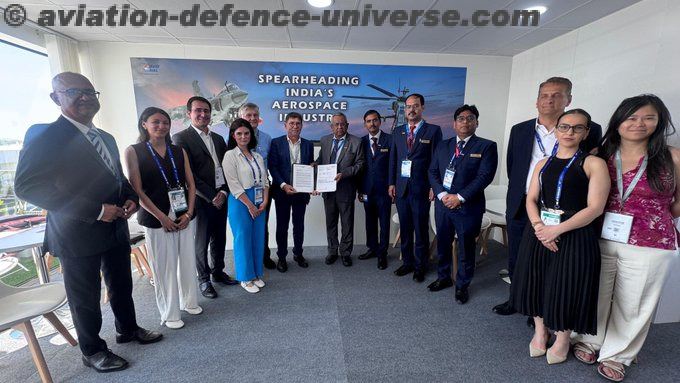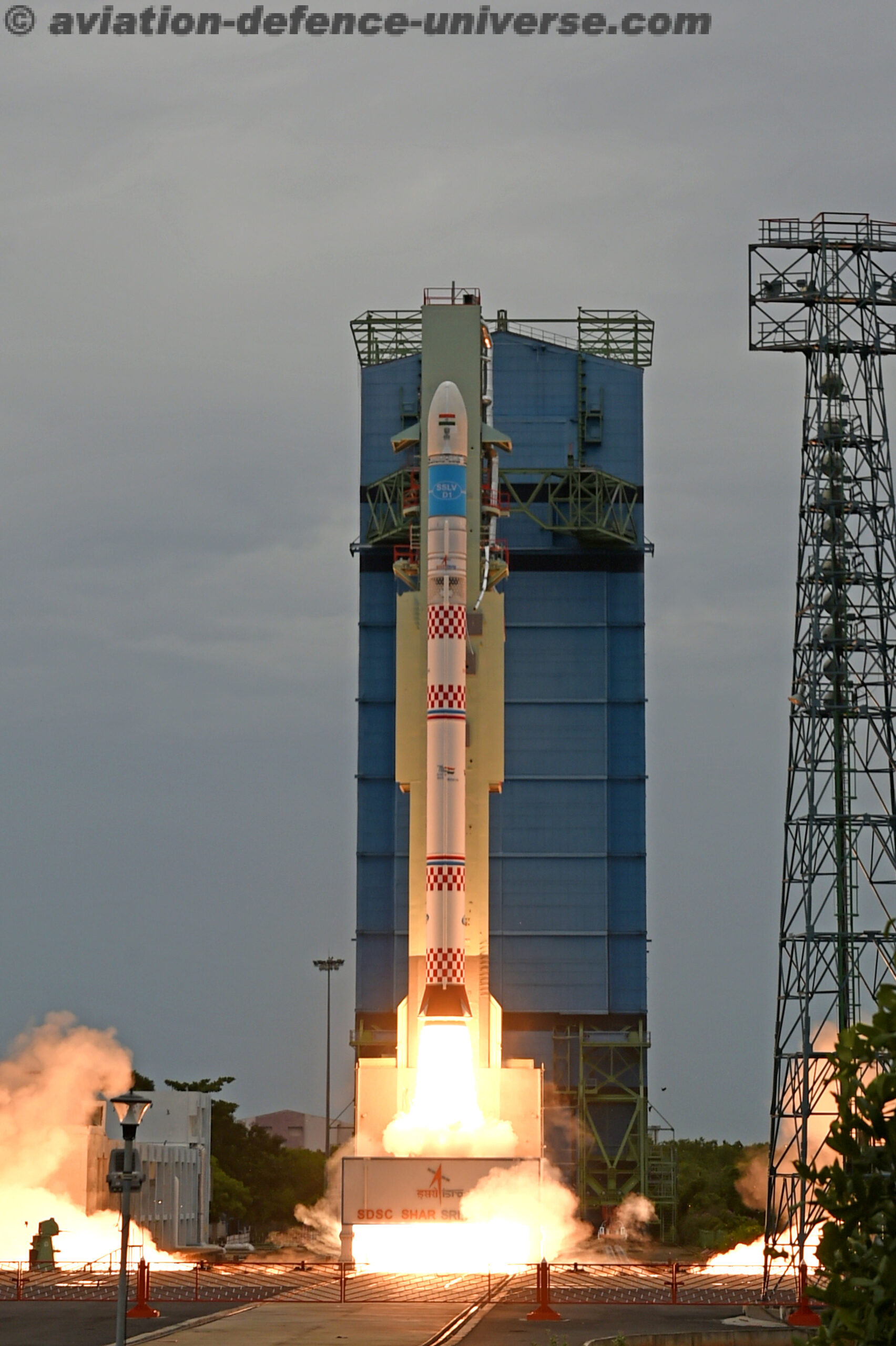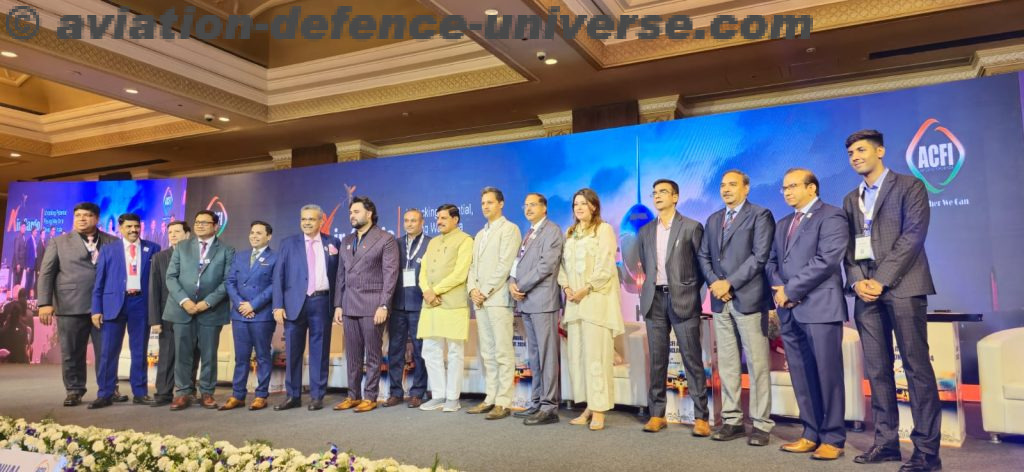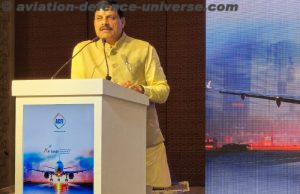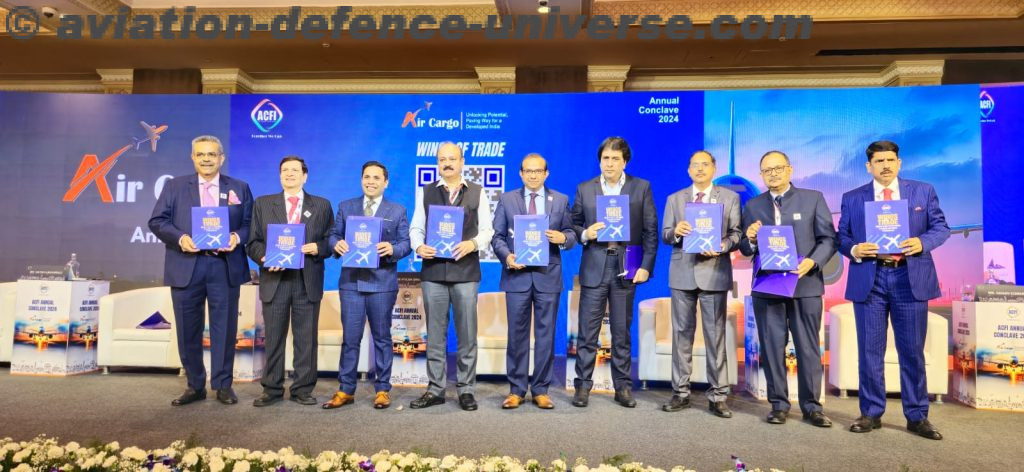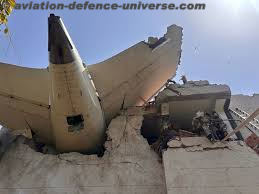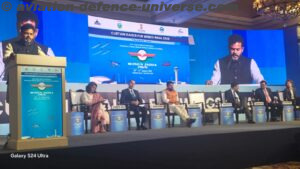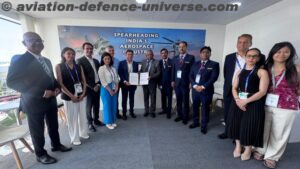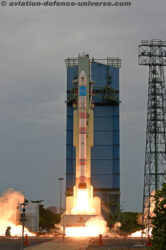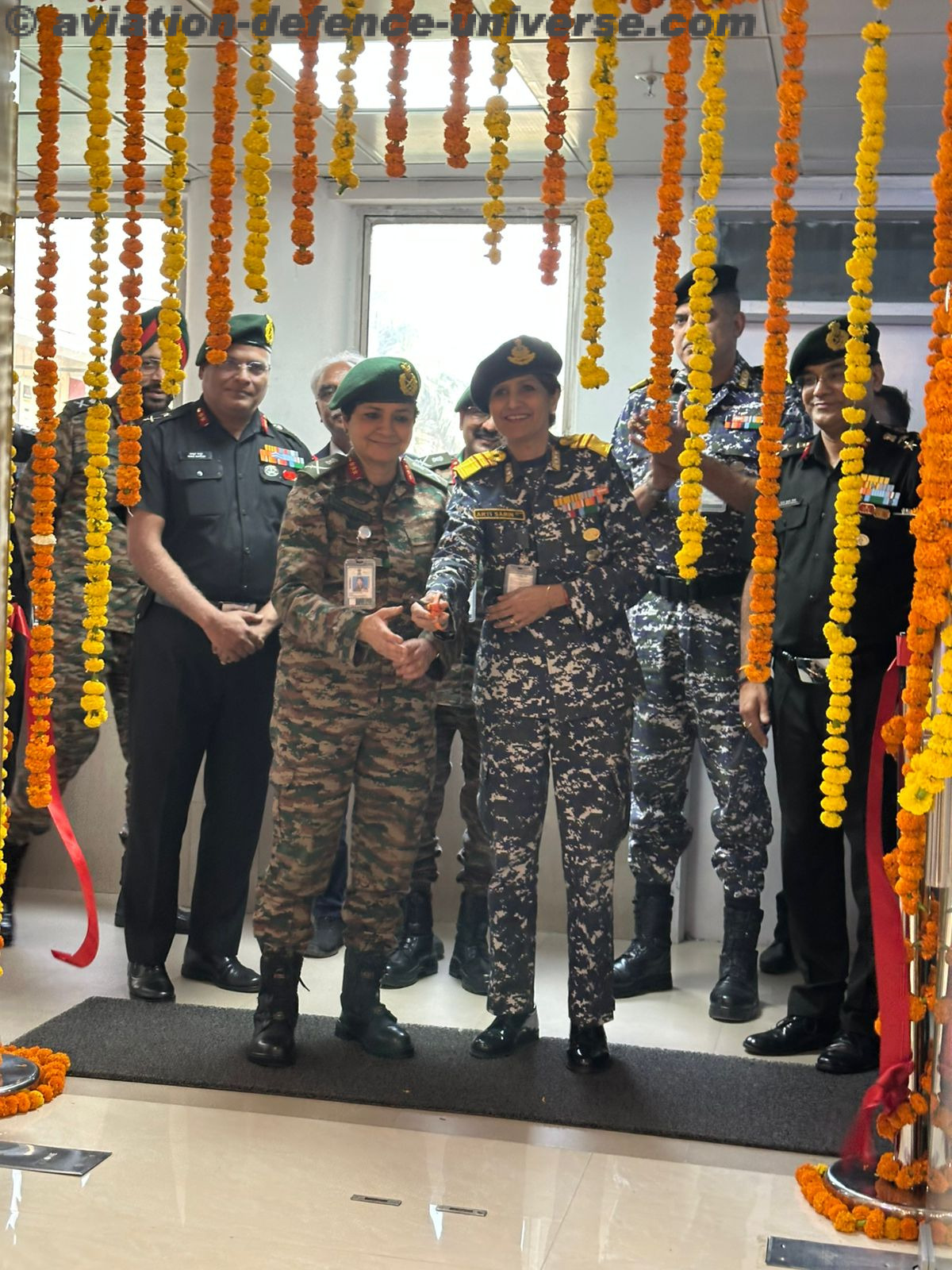- Industry Experts Call for Reduced Transshipment Delays and Enhanced Air Freight Services
- Government and Industry Leaders Discuss Strategic Partnerships for Growth
- Technological advancements and sustainability take center stage
- Madhya Pradesh’s Potential as Major Cargo Center
- Government Reduces VAT on Aviation Fuel, Boosting India’s Air Freight Sector
New Delhi. 05 July 2024. It was the biggest story emanating from the Air Cargo Conclave 2024. Madhya Pradesh Chief Minister Dr. Mohan Yadav exalted that his state has every chance of becoming an air cargo centre similar to Delhi given its location and advanced infrastructure. Reiterating he informed that goods valued at six billion dollars are flown there via air cargo. From this vantage point, he claimed, Madhya Pradesh’s aviation cargo sector has enormous potential. The Chief Minister, extended an invitation to the aviation cargo sector to engage in state development and make investments there.
Madhya Pradesh, according to him, is situated in the middle of India. He claimed that the State now has a dense network of motorways, metros, and railroads built. The State is currently expanding its cargo and air transportation infrastructure. Every one of the state’s seven airports has the potential to handle cargo and informed that the only state where interstate aviation service has been implemented is Madhya Pradesh.
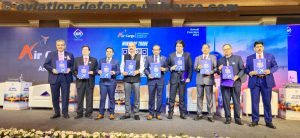 Air Cargo Conclave 2024, a premier event bringing together the brightest minds and leading professionals from the air cargo industry , hosted at the Taj Palace in New Delhi, was a landmark gathering, fostering innovation, collaboration, and growth within the sector. It was designed to address the dynamic challenges and opportunities faced by the air cargo industry, thinking on navigating the future of air freight, the event emphasized on the critical role of technological advancements, sustainability, and strategic partnerships in shaping the future of global logistics.
Air Cargo Conclave 2024, a premier event bringing together the brightest minds and leading professionals from the air cargo industry , hosted at the Taj Palace in New Delhi, was a landmark gathering, fostering innovation, collaboration, and growth within the sector. It was designed to address the dynamic challenges and opportunities faced by the air cargo industry, thinking on navigating the future of air freight, the event emphasized on the critical role of technological advancements, sustainability, and strategic partnerships in shaping the future of global logistics.
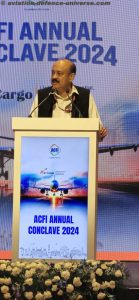 And no inaugural panel is complete without the government’s representation and the ministerial view point. The Ministry of Civil Aviation was at the conclave represented by Piyush Srivastava, Senior Economic Advisor who said that the VAT on ATF (Aviation Turbine Fuel) has been reduced from 25% to 18 %. Thirty-one states and union territories have already reduced VAT and the five remaining ones were also likely to do so. He strongly stated that India had six freighter aircraft prior to COVID-19. During COVID, when airlines began using passenger jets exclusively for cargo, this figure increased to 28. The number dropped to eight after COVID and is currently at eighteen, according to for the aviation ministry. People became accustomed to shipping cargo by air during COVID. The government approved the P2F (passenger to freighter) conversion. To increase air freight, many actions have been taken. Express shipping and e-commerce will only continue to expand. However, the procedures and turnaround times for air freight need to be shortened given the difficulties with transport by rail and road stated Srivastava.
And no inaugural panel is complete without the government’s representation and the ministerial view point. The Ministry of Civil Aviation was at the conclave represented by Piyush Srivastava, Senior Economic Advisor who said that the VAT on ATF (Aviation Turbine Fuel) has been reduced from 25% to 18 %. Thirty-one states and union territories have already reduced VAT and the five remaining ones were also likely to do so. He strongly stated that India had six freighter aircraft prior to COVID-19. During COVID, when airlines began using passenger jets exclusively for cargo, this figure increased to 28. The number dropped to eight after COVID and is currently at eighteen, according to for the aviation ministry. People became accustomed to shipping cargo by air during COVID. The government approved the P2F (passenger to freighter) conversion. To increase air freight, many actions have been taken. Express shipping and e-commerce will only continue to expand. However, the procedures and turnaround times for air freight need to be shortened given the difficulties with transport by rail and road stated Srivastava.
Higher security was inevitable in the aviation sector, and he acknowledged that this occasionally made their job more difficult. However, he was excited about collaborating with the private sectors to lighten their workloads and stay abreast of global best practices. But he issued a warning: these procedures would have to be compliant with their demands. One other crucial consideration was sustainability. Achieving zero carbon emissions was the goal. He emphasised that fulfilling this task was something they owed to the coming generations.
 Industry sources assert that the situation in the Red Sea is directly responsible for the recent more than twofold spike in air freight from India. Following a post-Covid recovery phase in which air cargo volumes had already peaked at 3.5 MT in 2017–18, this increase takes place. In order to maintain this pace, Yashpal Sharma, President of the Air Cargo Forum of India (ACFI), identified two critical areas for development: reducing transshipment delays and allowing foreign freighter planes to serve multiple Indian destinations in a single trip, a practice known as ‘double dipping’. In 2024, Sharma said at the ACFI Annual Conclave, less than 2 percent of freight moves globally by air and a mere 5% alteration in the Red Sea circumstances will result in jump for carriage by air. It is predicted that ton-miles, which are calculated by multiplying the volume of cargo moved by the distance travelled, will increase by 5.1% from 2023 to 3.2 trillion ton-miles. In order to avoid the Red marine and Gulf of Aden, where attacks by Yemen’s Houthi rebels have intensified—including a recent incident in which a vessel was sunk by a marine drone—ships are rerouting thousands of kilometres around Africa’s Horn.
Industry sources assert that the situation in the Red Sea is directly responsible for the recent more than twofold spike in air freight from India. Following a post-Covid recovery phase in which air cargo volumes had already peaked at 3.5 MT in 2017–18, this increase takes place. In order to maintain this pace, Yashpal Sharma, President of the Air Cargo Forum of India (ACFI), identified two critical areas for development: reducing transshipment delays and allowing foreign freighter planes to serve multiple Indian destinations in a single trip, a practice known as ‘double dipping’. In 2024, Sharma said at the ACFI Annual Conclave, less than 2 percent of freight moves globally by air and a mere 5% alteration in the Red Sea circumstances will result in jump for carriage by air. It is predicted that ton-miles, which are calculated by multiplying the volume of cargo moved by the distance travelled, will increase by 5.1% from 2023 to 3.2 trillion ton-miles. In order to avoid the Red marine and Gulf of Aden, where attacks by Yemen’s Houthi rebels have intensified—including a recent incident in which a vessel was sunk by a marine drone—ships are rerouting thousands of kilometres around Africa’s Horn.
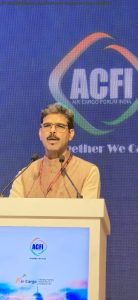 Dr. Surendra Ahirwar, Joint Secretary (Logistics and Trade), DPIIT, Ministry of Commerce and Industry, stated that the government’s goal under the PM GatiShakti Master Plan was to unite the states and all of the government’s branches. Additionally, it looked at the integrated development of the sector, skilled the workforce, and rationalised processes. The PM GatiShakti Master Plan included 48 ministries in addition to those states that have joined on board. He stressed that the main problem at the state and central levels was logistics. He continued by saying that every State has either embraced the logistics policy or was in the process of integrating it into their own framework. He stressed that the main problem at the state and central levels was logistics. He continued by saying that every State has either embraced the logistics policy or was in the process of integrating it into their own framework. The plan was to combine all digital channels related to different sectors. There was also going to be a logistics e-market in the future, which would aggregate road, rail, aviation, shipping, and other logistics services into one location, allowing buyers to see what services were offered at cheap prices. This would help to bring down the cost of logistics.
Dr. Surendra Ahirwar, Joint Secretary (Logistics and Trade), DPIIT, Ministry of Commerce and Industry, stated that the government’s goal under the PM GatiShakti Master Plan was to unite the states and all of the government’s branches. Additionally, it looked at the integrated development of the sector, skilled the workforce, and rationalised processes. The PM GatiShakti Master Plan included 48 ministries in addition to those states that have joined on board. He stressed that the main problem at the state and central levels was logistics. He continued by saying that every State has either embraced the logistics policy or was in the process of integrating it into their own framework. He stressed that the main problem at the state and central levels was logistics. He continued by saying that every State has either embraced the logistics policy or was in the process of integrating it into their own framework. The plan was to combine all digital channels related to different sectors. There was also going to be a logistics e-market in the future, which would aggregate road, rail, aviation, shipping, and other logistics services into one location, allowing buyers to see what services were offered at cheap prices. This would help to bring down the cost of logistics.
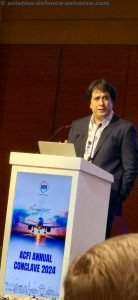 Over the day the conclave delved into a series of insightful sessions, panel discussions, and networking opportunities. Industry leaders, experts, and innovators shared their knowledge and experiences, providing valuable insights into the latest trends, regulatory updates, and market developments. The CEO and Director of CAPA India, Kapil Kaul, gave the keynote speech. He discussed the most important strategic issues and trends. In his opinion, the infrastructure of the airport outpaced the need. He believed that when the NOIDA airport opened, the freight sector would stand to gain the most.
Over the day the conclave delved into a series of insightful sessions, panel discussions, and networking opportunities. Industry leaders, experts, and innovators shared their knowledge and experiences, providing valuable insights into the latest trends, regulatory updates, and market developments. The CEO and Director of CAPA India, Kapil Kaul, gave the keynote speech. He discussed the most important strategic issues and trends. In his opinion, the infrastructure of the airport outpaced the need. He believed that when the NOIDA airport opened, the freight sector would stand to gain the most.
Shippers sought cargo safety and dependability, according to Delta Airlines’ Managing Director of Global Cargo Operations, Vishal Bhatnagar. They also needed to be clear about what to do when something goes wrong. Only with everyone’s participation could this be accomplished. Managing Director of Continental Carriers Pvt Ltd Vaibhav Vohra stated that shippers did not want to be concerned about goods. He was concerned about a plethora of issues. According to Adani Airport Holdings Ltd.’s Chief Cargo Officer Manoj Singh, a shipper anticipates consistently better services. Providers of services needed to consider alternatives to what shippers would typically expect from carriers.
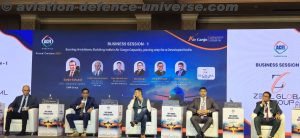 In a diverse lineup of speakers and participants from around the world, representing various sectors of the air cargo ecosystem, this conclave offers a unique platform for exchanging ideas, exploring new business avenues, and forging lasting connections that will drive the industry forward. What does the shipper want from the air cargo industry?’ asked Sanjiv Edward, CEO of GMR’s Cargo & Logistics. Shippers, according to Camilo Garcia Cervera, Chief Sales and Marketing Officer, IAG Cargo, preferred to work with partners who enhanced the value of their products. They want an industry driven by technology and various carriers cooperating rather than operating in isolation.
In a diverse lineup of speakers and participants from around the world, representing various sectors of the air cargo ecosystem, this conclave offers a unique platform for exchanging ideas, exploring new business avenues, and forging lasting connections that will drive the industry forward. What does the shipper want from the air cargo industry?’ asked Sanjiv Edward, CEO of GMR’s Cargo & Logistics. Shippers, according to Camilo Garcia Cervera, Chief Sales and Marketing Officer, IAG Cargo, preferred to work with partners who enhanced the value of their products. They want an industry driven by technology and various carriers cooperating rather than operating in isolation.
 The Fireside Chat -1 theme was Airline-Airport Coordination: Essential Component for Economic Development. The participants were Manoj Singh, Chief Cargo Officer of Adani Airport Holdings Ltd., and Peter Penseel, President of Delta Air Lines. Penseel thought the airport would be prepared for the arrival of wide-bodied aircraft in India. Was the infrastructure required there? Was ACFI prepared to manage the amount of cargo during the ensuing ten years as well?
The Fireside Chat -1 theme was Airline-Airport Coordination: Essential Component for Economic Development. The participants were Manoj Singh, Chief Cargo Officer of Adani Airport Holdings Ltd., and Peter Penseel, President of Delta Air Lines. Penseel thought the airport would be prepared for the arrival of wide-bodied aircraft in India. Was the infrastructure required there? Was ACFI prepared to manage the amount of cargo during the ensuing ten years as well?
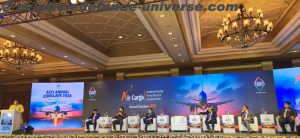 Context setting was done by Satish Lakkaraju, Chairman, ACFI Event Management Task Pillar. Business Session – 1 was on Soaring Ambitions: Building India’s Air Cargo Capacity, paving way for a Developed India and the speakers were Speakers Camilo Garcia Cervera, Chief Sales and Marketing Officer, IAG Cargo, Capt Nikhil B. Ved, Managing Director, Blue Dart Aviation Limited, Sanjiv Edward, CEO – Cargo and Logistics, GMR Group, Manoj Singh, Chief Cargo Officer, Adani Airport Holdings Ltd, Vishal Bhatnagar, Managing Director, Global Cargo Operations, Delta Air Lines and Vaibhav Vohra, Managing Director, Continental Carriers Pvt. Ltd.
Context setting was done by Satish Lakkaraju, Chairman, ACFI Event Management Task Pillar. Business Session – 1 was on Soaring Ambitions: Building India’s Air Cargo Capacity, paving way for a Developed India and the speakers were Speakers Camilo Garcia Cervera, Chief Sales and Marketing Officer, IAG Cargo, Capt Nikhil B. Ved, Managing Director, Blue Dart Aviation Limited, Sanjiv Edward, CEO – Cargo and Logistics, GMR Group, Manoj Singh, Chief Cargo Officer, Adani Airport Holdings Ltd, Vishal Bhatnagar, Managing Director, Global Cargo Operations, Delta Air Lines and Vaibhav Vohra, Managing Director, Continental Carriers Pvt. Ltd.
Business Session – 2: Collaborative Horizons: Unlocking Customer Expectations was moderated by Satish Lakkaraju, Chairman, ACFI – Event Management Task Pillar and speakers were Tia Bhaduri Mohan, Director – Ocean & Air Transport Planning, Electrolux, Alok Kumar Singh, Director-Global Logistics & Warehouse, VVDN Technologies, Aram Lee, Country Head – North and South, Samsung SDS India and Ramesh Mamidala, Head Cargo, Air India Limited.
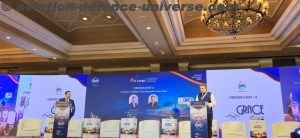 Fireside Chat – 2 was themed The Way to 10 Million Tons & Beyond for Indian Skies Speakers were Yashpal Sharma, President, Air Cargo Forum India and Mark Sutch, Chief Commercial Officer Cargo, Indigo getting the Indian perspective on cargo business straight.
Fireside Chat – 2 was themed The Way to 10 Million Tons & Beyond for Indian Skies Speakers were Yashpal Sharma, President, Air Cargo Forum India and Mark Sutch, Chief Commercial Officer Cargo, Indigo getting the Indian perspective on cargo business straight.
Business Session – 3: Future Skies: Transforming Air Cargo Through Technology, Innovation and Sustainability was an interestingly moderated by Keku Bomi Gazder, Managing Director & CEO, Aviapro Logistic Services Private LimitedS and the speakers were , Soham Choksi, Chief Executive Officer, Shipsy, AlAnood AlSuwaidi, Senior Vice President Cargo for Middle East, Africa and Asia Region, Menzies Aviation, Zvi Schreiber, Founder and CEO, Freightos Group, Kamesh Peri, CEO, Celebi Delhi Cargo Terminal Management India Pvt Ltd, Halit Tuncer, Cargo Director South Asia, Turkish Airline and Dr. Jivisha Joshi Gangopadhyay, Deputy Secretary, DPIIT, Ministry of Commerce and Industry.
The Air Cargo Conclave 2024 is not just an event but a pivotal moment to shape the future of air cargo, ensuring it continues to be a vital component of the global supply chain. The well planned agenda addressed a wide range of subjects, including the potential for air freight in India, the need for skill development, the need for government action, and other concerns.














